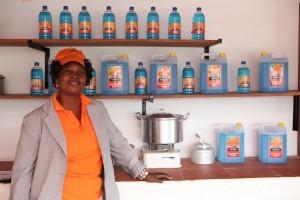
Two years ago I reported on an inspiring project kicking off in Mozambique: clean cookstoves, powered by locally produced ethanol made from locally grown cassava, sold neighbor-to-neighbor. CleanStar Mozambique attempted to tackle deforestation, land degradation, malnutrition, poverty, indoor air pollution and carbon emissions with one innovative initiative.
It appeared they'd thought of everything: The plan featured plenty of job development with a biofuel plant in the Sofala province, contracts with local farmers to grow cassava, a locally relevant marketing plan, and a pack of international investors to give the project a boost.
However, the project faced formidable challenges from the beginning. CleanStar Mozambique's plan was to create a market for stoves and build a full pipeline for fuel -- from cassava seeds to store delivery -- all at the same time. The venture-funded social enterprise needed to source local cassava, keep the factory running, manage shipping to ensure a consistent supply of ethanol at the stores, and educate consumers to build demand for the stoves. The marketing plan for the stoves was one of the most innovative parts of the plan. As I shared in an earlier post:
Mozambican women spend hours a day cooking the family’s meals over charcoal stoves, which are dirty, smelly and cause respiratory problems. They also don’t make the greatest cooking vessels, with their uneven heat and cooking surface....Ethanol is a clean-burning fuel, and ethanol stoves make cooking faster, cleaner, and more pleasurable. So, NDZiLO sells ethanol stoves, often woman-to-woman, like Avon.
Unlike other clean cookstove projects which donate stoves without educating consumers about their use, CleanStar Mozambique was focused on meeting the consumers' needs for a better cooking experience.
But the company struggled to build demand while managing the sourcing and operations of a biofuel plant. In 2013 the company decided to get out of the biofuel manufacturing business to focus on the stoves, stating in a press release:
To strengthen its future development CSM [CleanStar Mozambique] has decided to restructure its operations. As part of this, the company will suspend its agro-forestry and ethanol production operations in the Sofala province while conducting a strategic review of the best possible options for continuing these activities, to which CSM remains committed.
This restructuring included a new name: NewFire Africa.
Sadly, the restructuring proved unsuccessful, and earlier this month NewFire Africa announced a voluntary liquidation, due to continued losses.
In a statement, Investment Fund for Developing Countries and Novozymes lauded the energy company's 1 million liters of fuel and 33,000 stoves sold and stated that despite this demand, "The company was unable to achieve the scale and retail penetration required to make the venture financially viable."
CleanStar Mozambique had the backing of an international cadre of corporate and financial supporters and a strong business plan which focused on consumer needs. Yet, the firm still struggled to build demand for a better product with a cleaner cooking experience.
Sustainability is a field full of optimists.We have to be, right? We believe that despite evidence to the contrary, there is still time to turn the world into a place where we manage our resources with the needs of future generations in mind. Yet, it's important to remember that, at the end of the day, business is business. Customer needs are paramount. Despite how great NewFire Africa's solution was, it just wasn't good enough to beat out the other options middle-class Mozambican women have for cooking their meals.
So, maybe demand for a better stove was not as high as CleanStar Mozambique had hoped. Or maybe their marketing plan was just off. Maybe the product was premature for the market. There are a million reasons why good products fail.
That doesn't mean this audacious plan wasn't worth trying. We're left with 33,000 customers out there with a high-quality, cleaner-burning stove and millions of people around the world who were inspired by this initiative. CleanStar Mozambique shows us that running a true triple bottom line business is a challenge even under the best of circumstances. But somehow, recognizing how easy it is to fail means we have nothing to lose if we give it another shot.
Update: The CleanStar project managers contacted us to indicate that the required level of sales to sustain production and the lack of stove uptake or non-acceptance by consumers were not the main reasons why the project failed. They explain that the fees and costs were too high and that the market was not ready to pay the resulting high price for the product; in parallel a diversion of funds resulted in the early closure of the pilot project. The project has now been restructured, although withdrawal of support by the original investors means that the local partner (who was responsible for developing and managing the customer base) has been forced to secure capital elsewhere. As of November 2015, the local partner is working to bring the stove project back to profitability, though still constrained by the lack of available capital.
Image credit: CleanStar Mozambique
Jen Boynton is the former Editor-in-Chief of TriplePundit. She has an MBA in Sustainable Management from the Presidio Graduate School and has helped organizations including SAP, PwC and Fair Trade USA with their sustainability communications messaging. She is based in San Diego, California. When she's not at work, she volunteers as a CASA (court appointed special advocate) for children in the foster care system. She enjoys losing fights with toddlers and eating toast scraps. She lives with her family in sunny San Diego.














